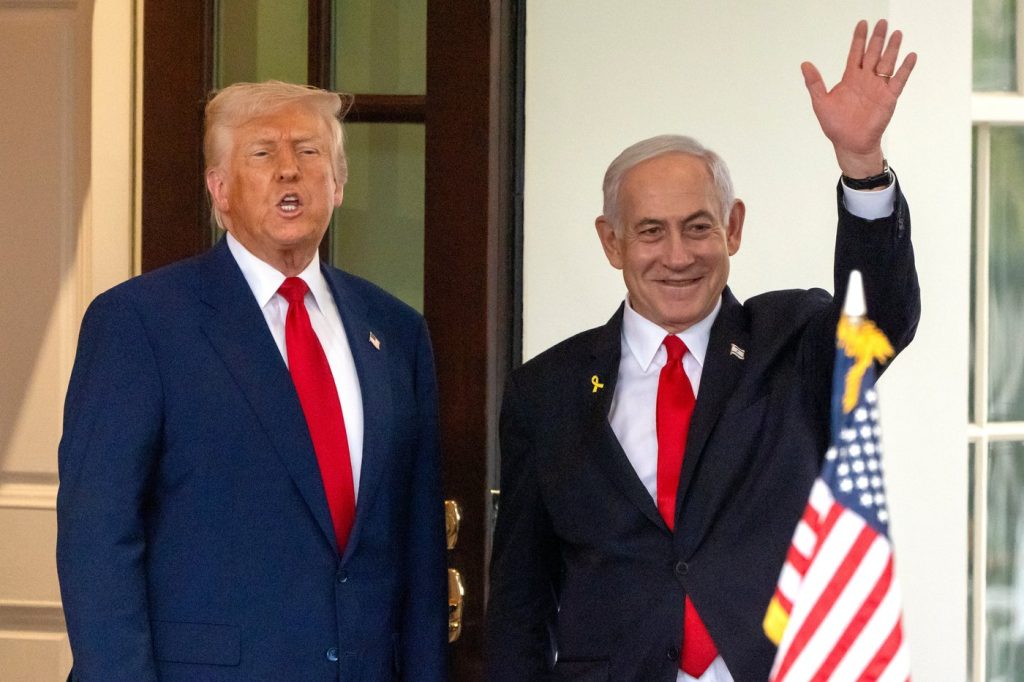Days after his defiant speech at the United Nations, wherein he rejected calls for an end to the war in Gaza, Israeli Prime Minister Benjamin Netanyahu is scheduled to meet with President Donald Trump in Washington. This meeting, set for Monday, takes place during a volatile period for Israel, which is experiencing a decrease in support from long-time allies. Domestically, Netanyahu's governing coalition is more fragile than ever, and the White House is showing signs of impatience regarding Israel's actions in the region.
The current dynamics raise questions about whether Trump, who has provided unwavering support to Netanyahu during the ongoing conflict, will adapt his stance and exert pressure on Israel to de-escalate the situation. In a social media post on Sunday, Trump asserted that there is a "real chance for GREATNESS IN THE MIDDLE EAST," claiming that all parties are prepared for a significant agreement that could be reached for the first time.
As Netanyahu and Trump prepare to meet in the Oval Office, expectations heighten for a joint press conference following their discussions. Political analysts describe this meeting as potentially one of the most significant moments in the lengthy relationship between the two leaders. Eytan Gilboa, a professor specializing in US-Israeli relations, highlights that Netanyahu may find himself faced with a choice between aligning with Trump or maintaining support from coalition partners who favor prolonging the conflict. A decision by Netanyahu to conclude the war could destabilize his political standing just one year before upcoming elections.
Experts believe that Trump may insist on a permanent ceasefire, leaving Netanyahu with limited choices, as he has consistently pledged to continue military operations until Hamas is dismantled. Should Trump indeed apply pressure, Netanyahu might seek to incorporate specific "red lines" into any peace deal, demanding the disbandment of Hamas and retaining military operational rights in Gaza if hostilities resume.
The relationship between Trump and Netanyahu has recently become strained, notably following an unsuccessful strike by Israel on Hamas officials in Qatar, which the U.S. views as a crucial mediator in ongoing negotiations. This frustration has contributed to Trump's growing impatience, evidenced by his recent comments about preventing Israel from annexing parts of the West Bank, an idea supported by far-right elements within Netanyahu's government.
Despite these tensions, some analysts argue that Trump's remarks regarding the West Bank may have been a strategic move designed to benefit Netanyahu by allowing him to counteract pressure from his coalition members. Trump raised expectations for the upcoming meeting, claiming that the U.S. is "very close to a deal on Gaza," although similar previous predictions have yielded no tangible outcomes, casting doubt on whether this time will be different.
According to sources familiar with Trump's discussions with Arab leaders, the proposed plan to resolve the conflict in Gaza entails an immediate ceasefire, the release of hostages within 48 hours, and the gradual withdrawal of Israeli troops from Gaza. Hamas has reportedly been holding 48 hostages, with 20 believed to still be alive, and has conditioned any ceasefire on a complete Israeli withdrawal from Gaza.
The plan, which also seeks to establish an international security force for post-war Gaza, does not include provisions for the expulsion of Palestinians, unlike earlier propositions. It insists on the disarmament of Hamas and the establishment of civilian oversight by a technocratic Palestinian committee, though Netanyahu has dismissed any role for the Palestinian Authority in postwar governance.
Global viewpoints on the conflict have shifted dramatically, with many countries expressing strong condemnation of Israel's actions in Gaza. Following the brutal attacks by Hamas on October 7, 2023, which resulted in approximately 1,200 Israeli deaths and hundreds taken hostage, there has been a noticeable decline in Israel's international support. Reports from the Gaza Health Ministry indicate over 66,000 Palestinians have died as a result of Israel's military response, exacerbating humanitarian crises in the region.
As diplomatic discussions continue, the challenges facing both Israel and Hamas remain complex. Analysts emphasize that many unresolved issues make a quick resolution unlikely, heightening skepticism about the prospect of a lasting peace agreement.











